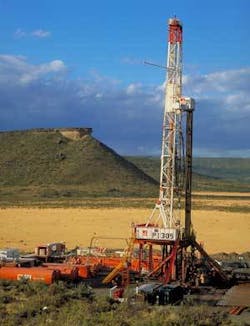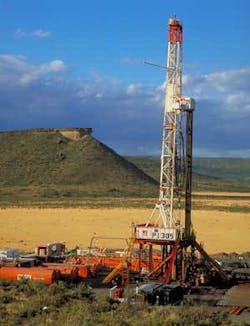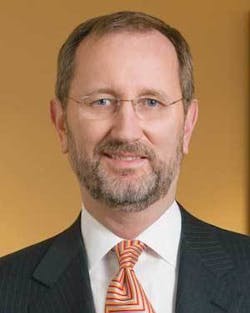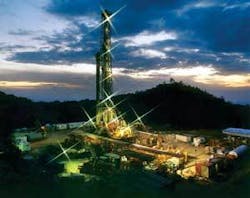Brazilian private equity firm buys Pride’s Latin American assets
Peter Howard Wertheim and Dayse Abrantes Special to OGFJ Rio de Janeiro
São Paulo-based GP Investments enters the oil sector with $1 billion purchase of Pride International’s Latin American land-based drilling and workover business and its E&P services business.
GP Investments Ltd., the largest Latin American private equity firm, based in São Paulo, Brazil’s industrial capital, has acquired Pride International Inc.’s land drilling rigs operating in the region for US$1 billion. The transaction closed on Aug. 31.
Betting on increasing oil and gas demand, GP plans to expand business through reinvestment and acquisitions, according to a company official. The purchase marks GP’s entry into the oil-services industry and includes assets in eight countries: 73 onshore rigs, two lake drilling barges and 135 workover rigs.
GP will pay cash, 60% of which will be financed through new debt taken on by a special purpose vehicle. The remaining US$400 million will be broken into three parts: GP’s Capital Partners IV fund will contribute $150 million; GP will provide up to US$100 million, which may be syndicated with co-investors; and $150 million will come from co-investors that have already committed to the investment.
The deal is one of the largest leveraged buyouts ever completed in Latin America, the largest undertaken by GP, and is also the first pan-Latin America investment, say Brazilian financial analysts.
Pride comments on sale
Louis A. Raspino, president and CEO of Houston-based Pride International, noted, “The sale of our Latin American land-based business segments represents a significant milestone in the transition of our company and further supports our stated strategic direction. With the close of the transaction, [Pride’s] contract drilling operations will be almost exclusively offshore, with an increasing focus on deepwater and other high specification assets.”
In an interview with OGFJ in May 2006, Raspino previously stated his intention of divesting what he described as “non-core assets” in order to increase the company’s presence in high-quality offshore basins. Pride had been seeking a buyer for its Latin American land-based assets for more than a year.
One of the world’s largest drilling contractors, Pride operates a fleet of 68 rigs, including two ultra-deepwater drillships, 12 semisubmersible rigs, 28 jackups, 14 tender-assist, barge and platform rigs, five managed deepwater rigs, and seven Eastern Hemisphere-based land rigs. The company has two additional ultra-deepwater drillships under construction with expected deliveries in 2010.
Pride’s combined 2006 Latin America land and E&P services segment revenues totaled US$824 million and achieved EBITDA margin of about 26%.
GP is counting on a surge in demand for oil services from US, European, and Chinese companies operating in Latin America, said Alyssa Grikscheit, a partner at Goodwin Procter LLP in New York.
“Private equity investors have seen that Latin America is an area that’s been largely ignored, and they see many, many opportunities there,” said Grikscheit, whose firm provides legal advice to private equity firms setting up operations in the region.
GP’s top executives
Antonio Bonchristiano, co-chairman, co-CEO, and president of GP Investments, joined GP in 1993 and has been a partner since 1995. He serves as a member of the board of directors of ALL and Hopi Hari, with experience in many supermarket chains and groups. Prior to joining GP, he was a partner at Johnston Associates, a finance consultancy based in London, and worked for Salomon Brothers in London and New York.
Fersen Lamas Lambranho, vice-president and co-CEO of GP Investments, joined GP Group in 1998 and became partner in 1999. He serves as a member of the board of directors of Telemar Participações and of BR Malls, and has been chairman and executive officer from other companies both in the telecom and in the department store segments.
The CFO of GP Investments, Allan Hadid, joined the company in 2006 as treasurer. Prior to working for GP, Hadid was investment officer of a family office from 2002 to 2006. He also worked in Banco Matrix from 2000 to 2002 as hedge fund analyst and from 1998 to 2000 as the portfolio manager of Matola Participações Ltda.
Since its inception in 1993, GP Investments raised more than US$2.5 billion from Brazilian and international investors and have acquired 40 companies in 11 different sectors.
In early 1994, GP Investments launched its first private equity fund, GP Capital Partners (GPCP I), with US$500 million raised among foreign institutional investors. Now, as the largest private equity firm in Latin America, its activities comprise its core private equity business and its asset management business.
The deal with Pride represents GP’s first acquisitions outside Brazil. The firm now has assets in Argentina, Colombia, Venezuela, Bolivia, Ecuador, Mexico, and Brazil, says a GP spokesperson.
Looking ahead
Given the strong demand for energy, the growing E&P activity and the industry-wide positive dynamics, the oil and gas services business is expected to post strong growth over the next few years.
The company’s CEOs told OGFJ that GP Investments will continue to consider potential transactions that provide significant investment opportunities anywhere in Latin America. Furthermore, GP Investments believes there will be significant private, public, and governmental investments into this crucial sector in the coming years.
For instance, the IPO of Ecopetrol, the Colombia state-owned E&P company, indicates that opportunities for companies like GP should increase substantially.
The Pride deal also represented the first move for GP Investments into the oil and gas sector, although the company has significant experience in investing in large infrastructure companies.
GP speaks with OGFJ
“At this time, there are no immediate plans to further expand in the oil and gas sector or internationally,” added Bonchristiano.
In an exclusive interview with OGFJ, Antonio Bonchristiano, co-chairman, co-CEO, and president of GP Investments, said that “the equipment we purchased is in excellent condition.”
GP Investments’ plan for the company included expanding the fleet with new state-of-the-art equipment as well upgrading some of the existing rigs.
Citibank acted as GP Investments’ financial advisors in this transaction, and law firm Cravath, Swaine and Moore provided legal counsel. GP Investments also worked with Spears & Associates Inc. as technical advisors.
“Through its IPO, GP Investments was able to become the largest investor in GP Capital Partners III (45% of the commitments) and in GP Capital Partners IV (40% of the commitments), which provides a very high alignment of interest between the general partner and limited partners, as well as facilitating the fund raising process, since you begin with a lot of momentum,” said the co-CEO.
“The key benefit for our firm is that we now have the permanent capital, which gives us staying power and the ability to benefit from downward cycles when it is difficult to raise new funds but it is when you can usually find the best investment opportunities,” explained the executive.
“Our share price has increased from US$14.75 at IPO to US$35 currently, which represents a 137% increase in 14 months,” said Bonchristiano.
In 2006, the firm completed its IPO on the Brazilian stock market (Bovespa) in São Paulo, becoming the first PE firm in Brazil and one of only a handful of private equity firms to be publicly traded, raising over US$300 million.
Brazil has experienced consistent growth in the last three years and this is expected to accelerate for the next five to 10 years. The IPO market is also burgeoning as stability and liquidity combine to offer an attractive environment for listing – not only for Brazilian companies, but also from regional companies (with presence in, but not from, Brazil, that is, subsidiaries) which are attracted to the highly liquid market, points out the CEO.
The oil and gas services industry is expected to grow 20% to 30% per year over the next few years, given the strong demand for energy, the growing E&P activity and the industry-wide positive dynamics, said the executive.
OGFJ pointed out that it is unusual for private equity companies anywhere to become publicly listed and GP’s executive responded, “Although there is a small number of publicly listed private equity companies, we believe having access to permanent capital is an important long-term competitive advantage, particularly in the emerging markets.”
The CEO also said that “GP’s decision is not related to the recent volatility in financial markets.”
Explaining why GP purchased onshore drilling rigs while in Brazil some 80% of the oil output comes from offshore, the co-CEO said that “Pride International’s Latin American operations provided the ideal platform to enter in the market, given its very strong reputation, dominant position in some key markets, strong client relationship, and very capable workforce. Under GP Investments’ leadership the company will expand the company’s reach to other countries and, potentially, services.”
Brazil’s land rig drilling market
Brazil never had a spot market for drilling rigs, neither onshore nor offshore.
Besides that, the pace of onshore activities is picking up again in Brazil, which can bring more players and hence, more value to the market.
“It’s difficult to find a value for the entire drilling rigs market in Brazil for several reasons, among them, the fact that the market is dominated by one player (Petrobras) that is responsible for the majority of the rigs under contract,” Mauro Andrade, senior manager, Petroleum Services Deloitte in Rio de Janeiro, told OGFJ. “The situation might be different in Argentina [which has] a myriad of players, mature rig market, major contractors with important share of the market, but no domination, etc.”
Asked whether GP Investments purchased the Pride assets at a good price, Andrade said it is always difficult to determine fair market value.
“The value of an onshore drilling rig in Brazil varies: newer drilling rigs that require less people to operate and can reach deeper objectives – e.g. 2,500 meters - can cost up to US$25,000 per day in Brazil. Older rigs with less capacity are cheaper. If I would have to point to an average, I would say US$21,000 is probably a good number. Long-term contracts tend to have slightly lower prices, but these days when there are absolutely no rigs available, the market dictates the show,” Andrade explained.
“I would indicate BCH Energy, Queiroz Galvão, Drillfor S.A., Prest-Prestação de Serviços Gerais Ltda., and Synergy Group (Petrosynergy) among the service companies operating onshore drilling rigs in Brazil. Petrobras also has its own rigs, but they aren’t available for the market,” he said.
“The Brazilian market for onshore operation is picking up again. If the National Petroleum, Gas and Biofuels Agency (ANP), the federal government agency, continues to implement its policy to offer onshore blocks in their bidding rounds, then the activities will continue at an interesting level,” added Andrade.
Petrobras announces plans
Petrobras, Brazil’s state-controlled oil company recently announced its business plan for the 2008-2012 period. The plan calls for investments of US$ 112.4 billion during four years, representing an annual average of US$ 22.5 billion. Of this, 87% (US$ 97.4 billion) will be invested in Brazil and 13% (US$ 15 billion) overseas. This amount represents an increase of 29% compared with the previous plan, contemplating 2007-2011.
Unlike Venezuela’s PDVSA, Petrobras has JVs with IOCs in Brazil and throughout the world (including in the US Gulf of Mexico), sometimes with a minority stake.
At the end of last July, Devon Energy started producing oil in Brazil becoming the first foreign company since deregulation a decade ago to do so without having partnered with Petrobras. Devon is the operator with South Korea’s SK Corp. Oil experts told OGFJ that this is another example that the de-monopolization of Petrobras is now really starting to bear fruit in terms of consolidating a competitive market.
The Brazilian company also has parts of its shares listed in the New York stock market (NYSE), Madrid, and Bovespa in São Paulo.
In July 2002, Petrobras Depositary Receipts began trading on the Spanish Latibex market, representing common (XPBR) and preferred (XPBRA) shares issued by Petrobras, following CVM (Securities and Exchange Commission of Brazil) and Central Bank’s approval.
In December 2002, Petrobras approved a listing of common and preferred shares on the Buenos Aires, Argentina stock exchange (Merval).
The Argentina market, the most mature market in the region, was getting back to life again after several years with low onshore exploration activities. Together with Argentina, Peru, and Colombia have also been able to attract investments for E&P activities in the past years – especially from Canadian and UK-based companies. As a result, Andrade said he thinks the future of Latin American markets for onshore operations is promising.
Beyond drilling
GP will be involved in oil-services operations beyond drilling. Pride’s Latin American business helps customers complete, maintain and enhance production from wells. Those services include pressure pumping, in which such substances as water or sand are injected into a reservoir to crack open rocks and make oil or gas flow easier.
GP Investments Ltd. is a Bermuda exempted company that consolidates certain of the activities of the GP Group, a private equity company in Latin America. The company’s activities consist of its core private equity business and GP Investments Limited asset management business.
GP Investments Ltd. seeks to invest at attractive valuations in established companies with one or more of the following characteristics: products with strong market positions, primarily dependent upon private sector orders, potential for significant productivity or growth increases, global competitive advantage, customer-driven, low technological risk, high proportion of export revenues, high barriers to entry and replicable buyout model.
The persistence of elevated oil prices has led to predictions of further consolidation in oilfield services sector. Bear Stearns analyst Robin Shoemaker says cash-flush companies are looking to reinvest with acquisitions. Before the deal with GP was concluded, she forecasted that “Pride International was an attractive takeover target.”
Shoemaker says the merger and acquisition activity should continue, particularly because so many oilfield companies are overcapitalized. Companies have used their healthy cash flows to pay down debt to levels well below necessary. That cash will continue piling up due to high oil prices, and oil services companies should be reluctant to let it sit on their balance sheets.
“Going forward, we believe that free cash flow will be used to make acquisitions based on compelling valuations and powerful operating synergies,” Shoemaker said.
GP and Advent
GP and such competitors as Advent International Corp. are stepping up energy acquisitions in Latin America. The need for private equity capital in the region’s oil industry is growing as governments in countries such as Venezuela and Bolivia, which nationalized its oil and gas industry in 2006, and Ecuador, which restricts foreign investment in its oil and natural gas resources, said Goodwin Proctor’s Grikscheit.
“Investors are finally making distinctions between the different countries of Latin America,” said Grikscheit. “You won’t see many people investing in Venezuela or Bolivia, but they see lots of opportunities in the other countries.”
Pride Latin America is a key player in the services market in Venezuela and will continue to work with Petroleos de Venezuela (PDVSA) and other majors present in the market.
PDVSA plans to launch an international tender to acquire 56 drilling rigs, the Venezuelan press quoted Energy and Oil Minister Rafael Ramirez as saying. As we go to press, no date has been set for the tender. Venezuela badly needs drilling rigs for onshore and offshore development, given its scant domestic manufacturing capacity. The country currently operates 90 drilling rigs.
Recently, Ramirez, who is also president of state-owned PDVSA, said Venezuela is starting its own state-run oil services company to provide services within the country. The minister also said Venezuela obtained 13 drilling rigs made in China.
Lots of greenbacks
GP’s co-CEO, Lambranho, was recently pictured on the cover of the prestigious Brazilian business weekly magazine IstoÈ Dinheiro with a banner phrase on the cover. “He is buying everything.”
A bit of exaggeration, but the magazine was referring to the fact that right after the deal with Pride, Lambranho flew to Belo Horizonte, capital of Minas Gerais state and entered into a definitive agreement to acquire a controlling stake in Brazilian magnesite and refractory producer Magnesita for US$639 million.
Magnesita is the largest producer of refractory material in Latin America, supplying the steelmaking, cement, and glass industries from six plants in Brazil and one in Argentina.
Thus within a three-day period in August, GP Investments closed two deals worth US$1.639 billion. GP also controls BR Malls, which after 19 acquisitions, became the largest administrator of shopping centers in Brazil, according to the magazine.
About the authors
Peter Howard Wertheim and Dayse Abrantes are independent journalists based in Rio de Janeiro, Brazil. Email: [email protected]. They are currently writing a book about Brazil’s oil and gas industry.





